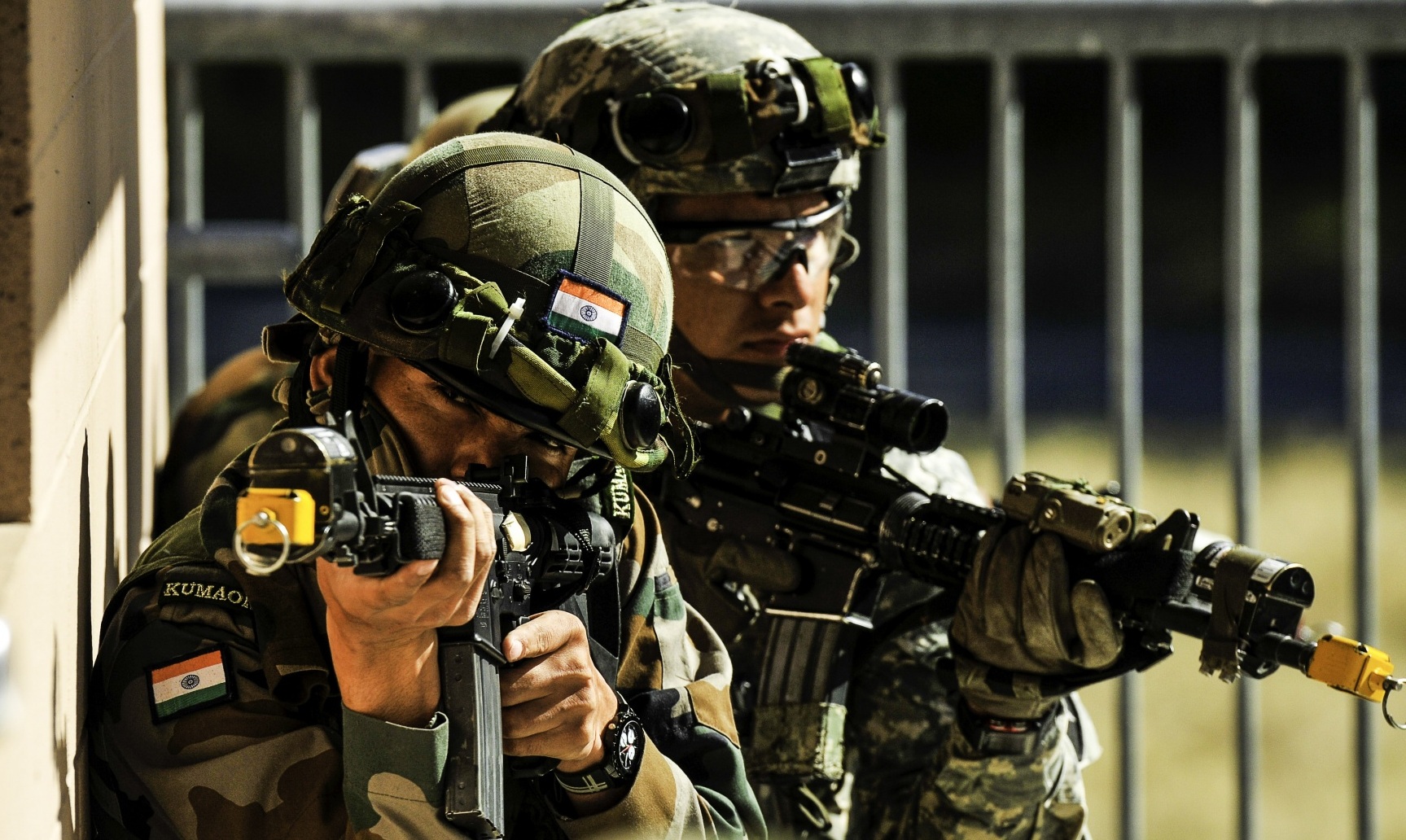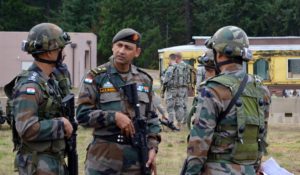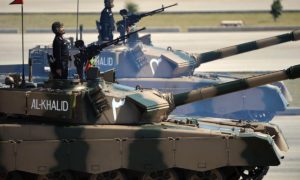https://bharatshakti.in/28710-2/







Image Courtesy: Live Fist
Editor’s Note
The debate for downsizing has been on for a long time. It’s the trend globally. The Shekatakar Committee has made some recommendations and these are already under execution, except perhaps for those that effect the Ministry of Defence (MoD). However, the budget for a lean and mean army, may not be lean at the end of the day. Such an army will need state of art equipment to be able to deliver the same or more, as compared to a manpower-heavy force. The author dwells on various aspects of this much-debated issue in his article.
Time to Downsize And More
Shelving further raising of the Mountain Strike Corps is good news. However, it is like putting a band-aid on a gunshot wound. While a Mountain Strike Corps is a strategic necessity, raising one from the scratch was an extravaganza in the first place. It was on the cards way back that a White Elephant was being raised. It was confirmed when the Government indicated additional financial support will not be forthcoming. If the Army wants to modernise it has to shed numbers. It is also clear from this case that the Armed Forces must be must be realistic about their wish lists. Indian politics and social conditions dictate that Governments, irrespective of their nature and composition, will not allot defence budgets beyond the range of 1.5-1.7% of the GDP. That should have been clear to the Armed Forces when the Prime Minister messaged during the first Combined Commanders Conference that more of the same was not an option. We not only need to fight with what we have but have to do more with less.
The Trendline of Shrinking Forces

Image Courtesy: Medium
The US Marines are reducing the strength of a squad from 13 to 12 and equipping them with the more accurate and lethal M27 Infantry Automatic Rifle as also better surveillance and communication capabilities. They are downsizing. China is reducing manpower and is equipping itself with cutting-edge combat technologies. The basic tenet being reduce manpower, increase firepower and supplement other capabilities. We were doing the opposite – increasing manpower without even basic rifles and being short of all kinds of ammunition.
Our financial woes and shortages are well documented. Certain austerity measures are being put in place to finance modernization as per reports. I believe Infantry is seeking inputs to delay retirement ages to cut pension bills. Desperate measures indeed. Resorting to such measures is inflicting a self-injury. Poor pay, ageing personnel and diminishing capability is an unwelcome recipe. Ideas of disposing defence land to fund our budgets are scandalous thoughts. But that’s another story for a later day. Bottom line – prune manpower and equip them well or reduce ourselves to “danda men”.
Boundary Length to Force Ratios
Every nation has a border to guard and a threat perception which guides the composition of its Armed Forces. Hence, I compared force strengths of USA, China, Pakistan and India with their boundary lengths. The data is interesting and tabulated below.
| COUNTRY | LAND BOUNDARY IN KM | STRENGTH OF ARMED FORCES | ARMED FORCE PERS /KM OF BOUNDARY | STRENGTH OF ARMY | ARMY PERS/KM OF BOUNDARY | REMARKS |
| USA | 12048 | 1347106 | 111.8 | 655940 | 54.4 | INCL MARINES |
| CHINA | 22117 | 2000000 | 90.42 | 1610000 | 76.8 | INCL STRATEGIC FORCES |
| PAKISTAN | 6774 | 653800 | 96.5 | 550000 | 81.19 | |
| INDIA | 13885 | 1443921 | 103.88 | 1303117 | 93.8 | INCL ASSAM RIFLES |

Image Courtesy: Marines
USA. US Armed Forces have been in conflict for over three decades now. They are a global capability-based force with an Army half our strength. Its Army is technologically advanced and is backed by a very potent Navy and Air Force. Yet Mr Trump speaks of downsizing and reducing budgets in NATO and other fora.
China. China is transiting from a threat-based to a capability-based force with increasing interests and footprints. The BRI is a hegemonistic economic expansion backed by an increasingly potent military force. Threat to its borders – both land and sea exists in its view. Yet its rapid military upgradation is with reducing numbers. The force to border length ratio of China is constantly reducing. The latest input suggests that China is pruning land based PLA by about 300000 to raise a Marine force of about 100000 to secure BRI interests.
(https://www.nextbigfuture.com/2018/07/china-creating-second-largest-marine-corps-to-secure-belt-and-road-interests.html ) That should give us some pointers.

Image Courtesy: Dawn
Pakistan. Pakistan is a threat-based defensive force. It is paranoid about India and is discovering the complexity of the Durand Line. A new front is emerging in its guts called the CPEC. It’s a perpetually failing economy. Despite that, its force ratios per km of frontage are far less than ours. Resultantly, it has been able to equip its forces better. One thing about the Pak Armed forces – however weak they are, they have been able to acquire key weapons and equipment to keep us on our toes.
India. India is a threat-based force – based on twin threats from Pakistan and China. However, per km of land boundary, India has the highest manpower anyway one looks at it. Much, higher than China and Pakistan. This is symptomatic of a bloated force. To attain equilibrium, we need to shed anywhere between 150000 – 200000 personnel. Though these are ballpark figures, they will not be off the mark. The centrality lies in downsizing.
Approach to Downsizing
The Indian Army and the Government is aware of this acute problem. However, the approach has been off the mark. All efforts, including that of the Shekatkar Committee, have been to reduce the “teeth to tail” ratio. My question is do we need all the teeth in the first place? If some teeth are not required, one ends up only with a toothache. If the nation feels that some of the teeth are still required, can we replace them with other forces? The Army must be made lean and mean.
Threat Reassessment and Rebalancing Approach. We are a Nuclear Weapon State and hence the space for all out conventional war is limited. Consequently, the threat from Pakistan is limited and from China, it is grossly overstated. I have elucidated it in my earlier writings. (Chinese Threat: A Reality Check ). Developments after Doklam reinforce my conviction.
A recent Chinese exercise in Tibet on civil military cooperation and in response to emergencies was probably a logistics exercise to learn to move troops and sustain them in High Altitude. They would have discovered their logistic and operational limitations during the Doklam crisis and that 1962 was a different ball game. That is why they probably sued for peace. All things considered, the futility of mass campaigns in high altitude would have dawned on them. Based on their theory of local war under hi-tech conditions they would now be looking to salami slice us through limited surgical operations and aggressive diplomatic initiatives. That to me is the greater danger for which we must be prepared (Are We Ready Across the Himalayas? ). Hence the need is to have well equipped forces and not mass.
India works on internal lines. It offers sufficient scope for reduction of forces. In my opinion raising of the Mountain Strike Corps must be reversed. Our three strike reserves must be restructured with mountain capable Infantry and Artillery and dual tasked for both borders. Our Pivot Corps with the Armoured Divisions shed from the Strike Corps will be enough to handle Pakistan. I have postulated this simple but effective approach in The Need For Military Rebalance .

Image Courtesy: live Uttar Pradesh
Review of Commitment in Counter Insurgency (CI) Operations. There is a requirement of a de novo and open-minded look at the huge commitment of the Army in J&K in CI role. This thought might be anathema and blasphemy to some. However, consider this. After three and a half decades of blood, sweat and toil in CI operations, what are the outcomes? Despite everything, the Indian Army is not exactly the darling of the local populace. The Government has downgraded us and started equating us with the other paramilitary and police forces. Budgets are inadequate. We have spawned an era of Army officers for whom J&K is an obsession, who are one dimensional CI warriors and cannot think beyond that. Some such senior officers lack the all arms vision which is the precursor to promoting Jointness. We keep holding the baby whenever a political abortion takes place.
Most importantly, resolution of J&K issues is not the mandate of the Army. There is an elected Government for it. The Indian Army is only a tool in the process. Let the Government retool the system. Time to move on. We need to shed the CI role to other security forces and get back to the elitism of defending the nation against external aggression. If we remodel our mindset and relook at this issue through a new lens, considerable manpower can be pruned.
The apparent approach is to hand over the Rashtriya Rifles to the Home Ministry or at the least adopt the Assam Rifles model. Simultaneously, we must reduce commitment of Infantry in CI operations. Replace them with Artillery, Armored Corps and Mechanized Infantry troops. We will do well to remember that these arms have delivered when given the task. In any case one arm is not the sole solution provider in CI operations. I can visualise lanyard thinkers agitating. Is it because they sense a threat to the edge garnered by them in promotions, postings and perks through majoritarianism, beret and lanyard colors?
Relook at Our Armed Forces
The other Services also need introspection. I am sure that each of them has come up with a wish list based on their threat perception. But that is the threat perception of each individual Service. It is not a holistic threat drawn through joint procedures. Further, if each Service is working on an exaggerated worst-case threat, the overall requirements of our Armed Forces will balloon beyond reasonability.

Image Courtesy: IAF
For example, our Airforce has a sanctioned strength of forty odd squadrons. When was this strength sanctioned and under what threat conditions? Has this ever been examined through a realistic national lens?
The same goes for Navy. While it is beyond doubt that there is a need to upgrade our armed forces to meet the emerging threats we face, there is also a need to be realistic about it. We cannot afford to have unrealistic wish lists. To bring in realism the first step is to put a CDS in place. This is the least cost, best value option. The recently constituted collective alternative – DPC – will be woefully inadequate.
In the end, I would like to state that all things considered, India is a land centric, status quo prone nation. Admittedly, we need to expand our Air and Seapower in response to expansionism. However, if our sovereignty is to be violated it will be from the land as Doklam indicated recently or Kashmir has proven historically. Our imminent threats remain largely land based. We cannot but adopt a “boots on the ground” approach. However, too many boots could result in bare footedness.
PS :– As much as one recommends the military to reduce its ranks, there is a requirement to reduce the number of civilian who are paid out of defense estimates also. In fact, a reduction in the overall strength of OFB and DRDO is also warranted. Many of the tasks – productive and nonproductive being carried out by them – can be outsourced or privatised. The girth of the MOD itself needs a relook. It’s no secret that every static HQ gathers moss and bloats to become ineffective.
Lt Gen P R Shankar (Retd)
(Disclaimer: The views and opinions expressed in this article are those of the author and do not necessarily reflect the official policy or position of BharatShakti.in

Comments
Post a Comment